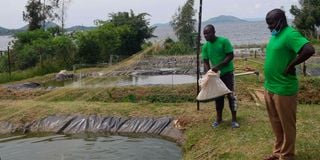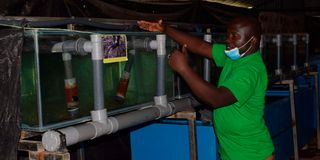Premium
Fish farming ecosystem: Raring black soldier flies to feed fish

Fredrick Juma (right) and an employee attending to one of his fish ponds at Hydro Victoria Fish Farm at Lukoba Beach, Busia County.
Hydro Victoria Fish Hatchery in Bunyala, Busia County is a bee hive of activities when the Seeds of Gold team visited the site on a chilly Friday morning.
Three women are feeding the fish in 11 ponds while four young men are cleaning the compound.
The farm owner, Mr Frederick Juma, offers to take us around his fish ponds occupying one-and-a-half-acre land near the lake.
The farm also has a fish hatchery where he rears tilapia fingerlings often sold out to farmers with fish ponds or cages around Lake Victoria.
“Hydro Victoria is an integrated farm where we do hatching of tilapia and catfish varieties then sell to farmers,” says Juma.
Although the farm has been set aside majorly for fish farming, Mr Juma also rears pigs, poultry and black soldier fly.
Animal waste from the pigs and poultry is used to feed the black soldier fly which, upon maturity, are fed to the fish in the ponds.
"I started fish farming back in 2017 having cages at Usenge Beach, Siaya County," says Mr Juma.
While in Siaya, he would face a shortage of fingerlings forcing him to travel as far as Murang’a County whenever there was need for a fresh supply.
Fingerlings’ hatchery
By 2018, he had made up his mind to start his own fingerlings’ hatchery at a farm he purchased in Bunyala, Busia County.
“In the past, I would travel as far as Murang'a to get the young fish. However, that is no longer the case here since we now hatch the fingerlings and sell them out to farmers," says Mr Juma.
He adds: "in a month, each hatchery can produce up to 100,000 tilapia fingerlings and 10,000 catfish fingerlings."
The fingerlings are often supplied to farmers in Siaya, Kakamega, Busia and Kisumu counties.
Within two years of running the fish hatchery, Juma was able to move his fish cages from Siaya and fully focus on the new farm.
“In the beginning, I would spend up to Sh10,000 or more to purchase fingerlings but that is no longer the case since I have them in my hatchery, “says Juma.
While the fish business had been flowing smoothly, the farmer reveals Covid -9 pandemic had presented them with a challenge - shortage of fish meal.
He explains that the fish farmers would travel over long distances in search of the product before he decided to intervene.
At first, he began by buying feed in large quantities from producers in Kisumu, Nairobi and Uganda to supply to the farmers.
In 2021, Mr Juma started black soldier fly farming as an alternative feeding ingredient which upon formulation is given to the fingerlings.

Fredrick Juma attending to the fish hatchery at the farm. They produce 70,000 fingerlings of both tilapia and cat fish.
“The poultry and the pigs have been reared for the purposes of harnessing organic waste which we use to feed the black soldier fly,” says Mr Juma.
Black soldier fly
According to him, aquaculture is still very young in Africa while access to feed is one of the greatest impediments thus the need to explore different sources of nutrients.
The insect hatchery has been placed on a raised ground to avoid its consumption by crawling animals or poultry.
The hatchery is also enclosed in a net to avoid the insects from flying away.
In the hatchery, the insects are placed in different crates depending on their stage of the development.
The adult insect is placed in a hatchery with pieces of wood where they lay hundreds of eggs. Here the insects are fed and have water to drink.
The eggs are then moved to a different crate filled with organic waste ranging from banana and potato peels, rotten tomatoes, chicken and pig waste for five days.
Once they are hatched, the insect larvae are reared for 12 days. According to Mr Juma, the amount the larva feeds on is four times its weight.
“The insect converts up to 60 percent of the waste into proteins. It is always harvested after 15 days before it moves to the pupa stage,” says Mr Juma.
The dead insects are then dried, crushed and mixed with other ingredients and fed to the fingerlings.
The farmer shares that the insect requires very little labor and one only needs to keep feeding them with organic waste and water.
When left to move to the pupa stage, the insect protein level always decreases as it relies on the proteins stored in its body to develop.
At this stage, the pupa can only be useful when left to grow to the full grown insect and is moved to the hatchery to begin laying eggs.
Dr Erick Ogello, from Maseno University’s Department of Animal and Fisheries Sciences, says that black soldier fly is a new frontier that is slowly being embraced by fish farmers for provision of cheap proteins.
Dr Ogello says that the insects are easy to grow, feed on organic waste and reproduce at a faster rate.
Once the insects reach the larva stage, they are harvested, dried and used to feed chicken or crushed before they are fed to fingerlings.
“The insects are rich in omega fats which are good for the fingerlings, the fact that they are easy to produce makes them even more attractive,” says Dr Ogello.
“The proteins help in the fast growth of the fish and protects the fish from getting sickly.”
He adds that the insects can be used as a whole or are formulated using other ingredients like cotton seeds and soya beans meal before they are fed to fish.





